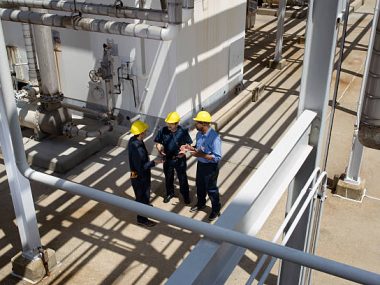How many jobs are available in oil/gas transmission? The oil and gas transmission industry plays a vital role in transporting energy resources across vast distances, ensuring a steady supply to meet global demands.
With its complex infrastructure and extensive network of pipelines and systems, this industry offers a diverse range of employment opportunities.
For those considering a career in the oil and gas transmission sector, it is important to understand the job market and the multitude of roles available.
The demand for oil and gas continues to grow, creating a constant need for efficient transmission systems and skilled professionals to operate and maintain them.
From technical positions involving pipeline design and engineering to administrative roles supporting day-to-day operations, the industry offers a wide array of jobs catering to various skill sets and interests.
In this article, we will explore the job opportunities available in the oil and gas transmission industry.
Whether you are a recent graduate looking to start your career or a seasoned professional seeking new avenues in the energy sector, understanding the job landscape in oil and gas transmission is crucial.
By gaining insights into the various opportunities and industry dynamics, you can make informed decisions about pursuing a rewarding career in this dynamic and essential field.
Also Read:
How Many Jobs Are Available in Automotive Aftermarket?
How Many Jobs Are Available in Medical/Dental Instruments?
How Many Jobs Are Available in Oil/Gas Transmission?
The oil and gas transmission industry offers a significant number of employment opportunities across the globe.
With the increasing demand for energy resources and the expansion of oil and gas infrastructure, the need for skilled professionals in this field continues to grow.
In the realm of oil and gas transmission, there is a wide range of job roles available to suit diverse skill sets and interests.
Technical positions encompass pipeline design, construction, and maintenance, requiring expertise in engineering, surveying, and project management.
These roles involve ensuring the safe and efficient transport of oil and gas through pipelines and other transmission systems.
Furthermore, the industry requires professionals in operations and maintenance, responsible for monitoring pipeline performance, conducting inspections, and addressing any issues promptly.
Environmental and safety specialists play a crucial role in ensuring compliance with regulations, minimizing environmental impact, and safeguarding the well-being of workers and communities.
Administrative and support positions are also integral to the functioning of oil and gas transmission companies.
These roles involve managing logistics, procurement, scheduling, and financial aspects of operations.
The number of available jobs in oil and gas transmission fluctuates with market conditions, infrastructure development, and technological advancements.
Factors such as geopolitical dynamics, regulatory changes, and the transition to renewable energy sources can also impact the job market.
However, the overall trend suggests a steady demand for skilled professionals in this industry.
It is important to note that the job market in oil and gas transmission varies regionally, depending on the concentration of oil and gas resources, existing infrastructure, and economic factors.
Regions with significant oil and gas production, such as the Middle East, North America, and Russia, tend to offer more employment opportunities.
Overall, the oil and gas transmission industry provides a diverse array of job opportunities.
Whether in technical, engineering, operations, environmental, safety, or administrative roles, skilled professionals are needed to ensure the efficient and secure transport of oil and gas resources.
While the job market may be influenced by various factors, the demand for qualified individuals in this field remains substantial.
Qualifications and Skills Required for Jobs in Oil/Gas Transmission
Jobs in the oil and gas transmission industry require a specific set of qualifications and skills.
Technical positions often demand a background in engineering, surveying, or project management.
Strong analytical and problem-solving abilities are crucial for diagnosing and resolving pipeline issues.
Operations and maintenance roles necessitate knowledge of pipeline systems, inspection techniques, and safety protocols.
Environmental and safety positions typically require a solid understanding of regulatory compliance, risk assessment, and environmental impact mitigation.
Administrative and support roles may require organizational skills, financial acumen, and proficiency in logistics management.
Additionally, effective communication, teamwork, adaptability, and a commitment to safety are essential qualities across all job types in the oil and gas transmission sector.
Challenges and Opportunities in the Oil/Gas Transmission Job Market
Salaries and compensation in the oil and gas transmission industry can vary depending on factors such as job role, experience, location, and company size.
Technical and engineering positions, especially those requiring specialized expertise, tend to command higher salaries.
Operations and maintenance roles also offer competitive compensation due to their critical nature.
Environmental and safety specialists may receive compensation packages that reflect their expertise in regulatory compliance and risk management.
Administrative and support positions may vary in terms of salary based on responsibilities and experience.
Furthermore, the location of employment can impact salaries, with regions rich in oil and gas resources often offering higher compensation.
Overall, the oil and gas transmission industry typically provides salaries that align with the specialized skills and demands of the sector.
Tips for Finding and Applying to Jobs in Oil/Gas Transmission
When searching for jobs in the oil and gas transmission industry, consider the following tips.
Start by researching and networking within the industry to gain insights and connections.
Explore job boards and websites specifically catering to the energy sector.
Tailor your resume to highlight relevant skills and experience, emphasizing technical expertise, certifications, and industry knowledge.
Customize your cover letter to express your enthusiasm and understanding of the oil and gas transmission field.
Prepare for interviews by studying the company, its projects, and industry trends.
Demonstrate your adaptability, problem-solving abilities, and commitment to safety during the interview.
Finally, follow up with a thank-you note to express your appreciation and maintain a professional impression.
Also Read:
How Many Jobs Are Available in Industrial Specialties?
How Many Jobs Are Available in Air Freight/Delivery Services?
Conclusion
The oil and gas transmission industry offers a multitude of employment opportunities for individuals with diverse skills and interests.
From technical and engineering roles to operations, maintenance, environmental, safety, and administrative positions, there are various paths to explore.
While the job market may experience fluctuations due to factors such as market conditions and evolving energy landscapes, the overall demand for skilled professionals in this industry remains substantial.
By understanding the qualifications and skills required, staying informed about market trends, and effectively navigating the job search process, individuals can pursue rewarding careers in the dynamic and essential field of oil and gas transmission.






